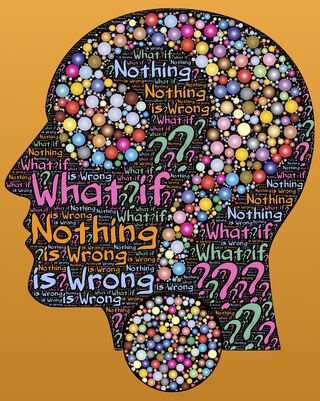Mindfulness
The Paradox of Mindfulness
It's not what its name suggests.
Posted November 3, 2021 Reviewed by Jessica Schrader

Mindfulness is often explained in concepts and ideas. That said, it's really about experiencing directly, with awareness, not concepts. To illustrate this point, renowned Buddhist monk Ajan Brahm distinguishes between two modes of being in the world: the experiencing mode and the conceptual mode. In the first (more closely associated with mindfulness), we're sensing and feeling into our experience, outside and beyond words, concepts, narration, and storytelling. In experiencing mode, we're unmoved by external circumstances, resting our attention and awareness in just noticing or observing. In the second conceptual mode, which dominates most human functioning, we're constantly forming meaning, narrating, analyzing, and storytelling.
When perpetually lost in this default, often mindless, all-too-common way of being in the world, we can get easily and frequently stuck in a boring, myopic, and redundant self-oriented narrative that depletes us of our vital energy. Over-involvement with the second, conceptual mode has been referred to as the mind's "default network" in mindfulness science (where the mind tends to wander when it's not actively involved in a specific task).
To illustrate the importance of cultivating the mindful, experiencing mode, at a retreat I attended in 2014, Ajan Brahm told a story. It was of a disciple who, when hiking with his master, mentioned how beautiful the weather and the scenery were. In that moment, the master then taught the disciple the valuable lesson: that when the disciple said those words, he had effectively lost focus on the weather and scenery, only to be fully engrossed with the words themselves. The disciple had come out of his mindful hike and went into the storying mode, all too automatically. This happens to too many of us. We miss out on life and get stuck in an unnecessary, sticky, neverending web of words and meaning-making. Mindfulness is more about embodying and inhabiting the experiencing, pre-conceptual mode of being.
Mindfulness is what’s happening beyond concepts, thoughts, ideas, and language. It’s about opening up to the unfolding of our experience, raw sensing with your five senses, other body sensations, feeling, and noticing. The words will always fall short, and at worst are a distraction, a trojan horse that can hijack your mind in the most crucial moments, although on the surface they can appear intensely seductive. A low-hanging fruit example of this is an orgasm; you can't experience it without having one and any verbal explanation of one will always fall woefully short.
7 Mindfulness Insights
As we learn to marinate in the first experiencing (mindfulness) mode, we'll first notice how deceptively challenging it is. If we're persistent and consistent, you may start to experience a few of the following insights that can make our lives happier, easier, and calmer. They come from both my academic study of mindfulness, as well as my own daily practice since 2010.
1. We suffer more in imagination and thoughts (story mode) than in reality itself (mindfulness mode). For example, thinking about upcoming challenges is almost always worse than dealing with them in the present.
2. The mindfulness mode we cultivate in meditation directly strengthens our capacity for concentration; while temporary by nature, as concentration grows, it is inherently pleasurable; this pleasure can spread into seemingly mundane, quotidian tasks,
3. The ability to witness, without automatically getting hooked into a certain narrative, substantially increases the quality of your life. For us to be stressed, we often need to perceive a threat, which frequently can be from the verbal meaning we ascribe to it.
4. By practicing “mindfulness of emotion,” you can learn to watch anger (or any feeling) instead of automatically getting caught in it. In doing so, you can experience that it is virtually impossible to stay angry for a long time without following the trains of thought anger would aimlessly take him on, and thickening the fabricated story that was justifying it. The half-life of an emotion, by itself, without being fueled by thought, is roughly 90 seconds.
5. You can witness that negative feelings are intrinsically transitory when observing them curiously, independent of the narrative underlying them.
6. You can access a sense of well-being from merely being alive and sensing your innate, ever-present aliveness, which you cultivate through mindfulness practice.
7. Just like sleep and hunger, the mind is malleable, it can relearn to settle into stillness naturally. Stillness is its natural state (think of the moment you were conceived in your mother's womb), just like the stillness 30 feet under the ocean, below the surface level agitation. Ironically when we welcome distraction during meditation, it happens less. Practicing brings you closer to this stillness.
Mindfulness, thus, may be the wrong word. When we hear the prefix mind, it links to verbal thinking in our minds, which I've just expounded, isn't mindfulness. It's a poor translation from the original word in the Pali language. “Heartfulness," "presence,” or “systematic attentional training” may be better.
Happiness, peace, connection, well-being, and all the other emotions we chase frantically in life are built in the first, mindful mode. Why not practice and strengthen our capacity for this mode?




